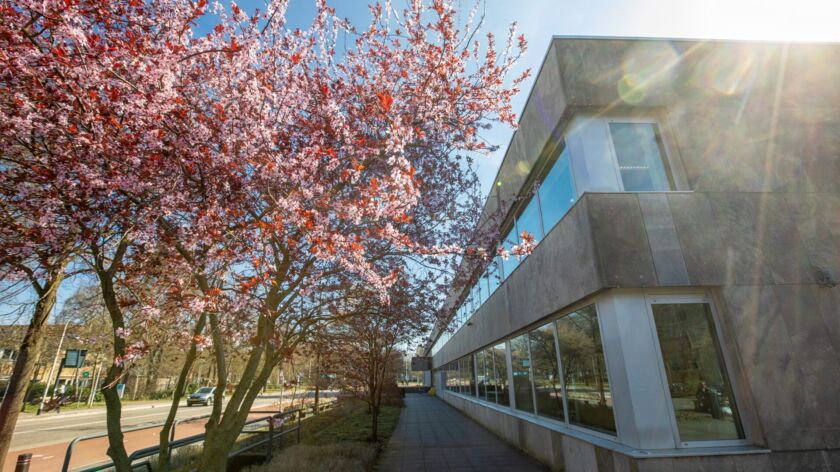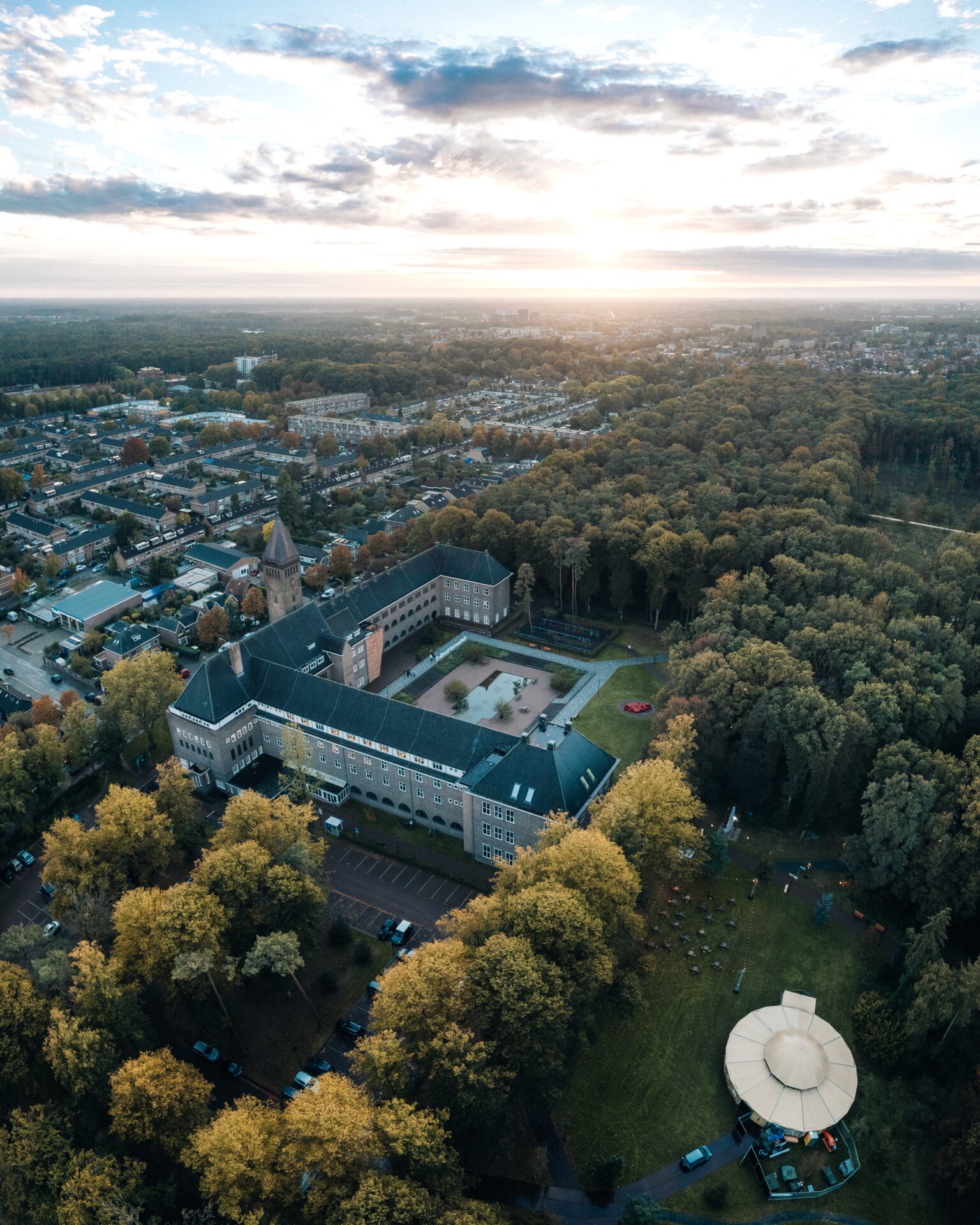Three newcomers and a possible return: plenty of choice in student council elections too
-
 Afbeelding: Dick van Aalst
Afbeelding: Dick van Aalst
Elections for the University Student Council take place this week. Besides the incumbent parties, ISEC is also trying to win another seat and there are three newcomers. An overview.
Elections for the University Student Council (USC) have begun: the ballot boxes have been open since Tuesday. There are five parties and two independents on the electoral list. And some newcomers too. So no shortage of candidates for the 14 places in the participational bodies. VOX explains four themes.
1. Plenty of choice
There’s no shortage of choice this year. In 2023, it looked as if AKKU would be the only party participating. Two years later, the situation is very different: with five parties and two independents, the list is longer than ever.
And it even includes three newcomers. Which means that you can vote for the independent Luan Winters, and Ahamed Infas Abdul Jabbar is also solo on the electoral list. The Team A.L.Y. party is also new this year.*
On the other hand, De Knokpartij did not submit a list, so is no longer represented in the participational bodies. The party was founded two years ago and fought for more democracy and transparency at the university. In its first year, the party won two seats, but that was down to one last year. Koen de Kooter, who held that seat last year, is now back on AKKU’s electoral list.
Also returning are the incumbent parties V.O.S., AKKU and Green+. ISEC (Inclusion & Social Equity Commission) is also participating again this year, after losing its only seat last year. “The issues we are fighting for didn’t suddenly disappear because we didn’t have a seat. On the contrary,” says ISEC list leader Parker Winkel.
2. Where are the differences?
There are many similarities between the parties regarding social safety and student wellbeing. All the candidates want a safer and more inclusive campus, albeit with different emphases or how they want to achieve that.
But there are also differences between them. For example, the theme of sustainability has high priority for Green+. “We are the only party that is looking at the bigger picture,” says Jannus van Wolferen. “We are not only concerned with the university of today, but also how best to pass it on to future students.”
For its part, ISEC is focusing more on international students. “We don’t just support internationals in Nijmegen,” says Winkel. “We also support international students who are not here because tuition fees are too high for them – or the housing market was not adequate. We want to make conditions better for those students in the future.”
There is also a difference in the supporters. In fact, V.O.S. (Verenigd Onder Studentenbelang) is mainly representing for the active student. Supporters therefore consist of umbrella organisations of study, sports, cultural, social and religious associations. Not unexpectedly, promoting active student life is therefore the core issue for the party. “We want to ensure that enrichment alongside your study programme remains possible,” says chair Bente Huntjes.
AKKU is not just a party within the USC, but also a student union. The party also helps organise campaigns against issues like government cuts and shortages on the housing market. The party also has a Palestine Working Group, some of whose members are active in the Nijmegen Student Encampment. “We are not just committed to students on campus, but also outside,” says party leader Noortje Smeenk.
3. What do the newcomers add?
Both independents are making big promises. “I put myself up for election out of a sense of responsibility to solve problems,” Winters says. “I didn’t feel that the other parties were focusing enough on the actual solution.”
For his part, Abdul Jabbar is representing students whose voices are not always heard, he says. In doing so, he brings his own experiences and struggles as an international student. “I’m not an average candidate in that respect. I chose to stand for election because I want to remain independent from a larger party within which you have to follow the group.”
Social safety and inequality are also important issues among the newcomers
Yet even among the newcomers, social safety and inequality are prominent themes in their manifestos – making them less intrinsically different from the incumbent parties than they might initially appear.
Winters wants to prevent situations where “people feel unsafe or isolated” and therefore stresses the importance “of working for unity within the university and for the mental health of everyone”. He would also like to see the university become more democratic, with students having more say in important decisions – for example, through voting.
Abdul Jabbar is also focusing on the mental health of students and on an open and inclusive campus. And like ISEC, he wants to represent international students.
Team A.L.Y. did not respond to questions from VOX (university magazine). It is therefore not clear what they wish to focus on or where they want to differentiate themselves from the rest.
4. The strategic principles by party
The election manifestos of all the parties can obviously be studied in detail on their own platforms. VOX (university magazine) asked the parties to write down their three key strategic principles. These are highlighted below by party.
“Our three pillars this year are an active and valuable student life, a vibrant campus and the recognition of associations,” says Bente Huntjes of V.O.S. “Based on these three pillars, together with the university and active students, we want to create a campus that feels like a second home. A campus where there is consideration for each other, where clubs can continue to exist and where we strive for a more sustainable, inclusive and sociable student life.”
“Our main point is that the university needs to ensure that sustainability is not compromised by the cuts,” says Van Wolferen of Green+. “In this respect, the most important points are that the university must stop greenwashing and ensure that it actually starts working towards a climate-neutral, plant-based future. And the cuts must obviously not be at the expense of social safety, student wellbeing and quality of the education.”
Student union AKKU also opposes the cuts, Smeenk says. “We also want a fair university: one that is transparent and takes the right to protest seriously. It should also sever ties with all Israeli institutions: after all, they are contributing to human rights violations. And we stand for an accessible campus. For example, free menstrual products, zero tolerance for power abuse and a sustainable campus.”
Make your voice heard
Voting is open until Monday, May 26. Only students at Radboud University can vote. More information can be found online.
Finally, ISEC’s key points. Winkel: “We want to reduce disproportionately high admission fees for internationals, ensure proper funding for the social work team and provide student psychologists which will eliminate the long waiting lists. Finally, we support better treatment of internationals in the housing market, with the university doing more against landlords who openly discriminate against international students.”
* Team A.L.Y. did not respond to questions from VOX (university magazine). They are therefore not included in this article.




